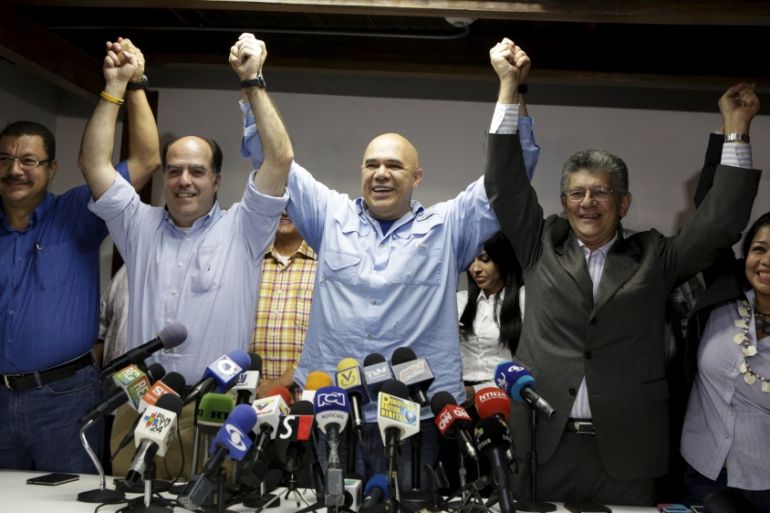Venezuelans losing hope as gridlock looms
Government seen as seeking to block opposition’s supermajority and “cheat” its way into amassing more powers.

Caracas, Venezuela – When Kilder Telleria, a 40-year-old graphic designer, voted for the opposition in last December’s parliamentary elections, he was not feeling particularly hopeful.
For Telleria, the Venezuelan government has consistently found ways to “cheat” its way into amassing more powers. At best, he thought, the opposition would seal a close win.
“They control the supreme court, the electoral council and the military,” Telleria said.
“They’ve even given away houses and taxis so people vote for them.”
When the opposition won 112 out of the 167 seats – and secured a supermajority in Venezuela’s once government-controlled assembly for the first time since 1999 – Telleria felt the country had taken a slow turn for the better.
|
|
“These elections mean we can bring about a change democratically and not through a coup or violence like it’s happened in the past.”
Venezuela has the highest proven oil reserves in the world. Yet, it has been suffering from chronic shortages of anything from milk to medical-diagnosis kits for over three years now.
Block-long queues outside shops of people standing under the tropical sun for hours has become a familiar sight.
According to the IMF, Venezuela’s economy is expected to contract 10 percent next year.
Economists say the country faces a real chance of defaulting on its debt before the end of the year.
The drop in oil prices is expected to worsen conditions in Venezuela whose economy depends almost exclusively on oil revenues.
In addition, a lot of the country’s infrastructure is crumbling with power outages often leaving half the country in darkness.
The government says the blackouts are the product of sabotage designed to destabilise Nicolas Maduro’s presidency.
Dire economic state
December’s polls suggested fewer people trust the government’s explanations for the country’s dire economic state.
Adding insult to injury, Venezuela has an abysmal crime rate. A local human rights group claims the murder rate is as high as 90 per 100,000 people, making it one of the most dangerous places in the world.
For Carolina Falcon, a public school teacher, it is no wonder that voter participation over 75 percent and that the opposition achieved such a sweeping victory.
She hoped this defeat, which she describes as a silent protest, would give the government a clear message.
OPINION: What’s left of the Latin American left?
“All you hear while you stand there in an endless queue is how angry people are at the government,” Falcon said.
However, her hopes have since been dashed.
“The illusion lasted less than a week,” she said, referring to the series of measures the government has taken since December’s elections and before the inauguration of the new assembly on Tuesday.
Despite signing a document in which it pledged to recognise the results – it recognised the results on election night – the government seems set on neutralising the opposition’s supermajority.
A week after the elections, president of the National Assembly, Diosdado Cabello, fast-tracked the approval of 13 Supreme Court judges who can effectively challenge any legislation passed by the parliament.
Choice of top judges
In addition to this, members of the ruling party have challenged the election of eight legislators.
Four of these charges, three opposition and one pro-government, have been approved by the government-friendly Supreme Court.
The move is seen as a clear indication that the government is seeking to block the opposition’s two-thirds majority, and has reawakened fears that the country will enter a gridlock scenario, with none of the much-needed economic measures being passed.
|
|
“The government continues to ignore what people, including its supporters, have been screaming for months. Things have to change,” Falcon said.
The opposition has called the decision a “judicial coup”.
It has pledged to attend the National Assembly’s inauguration on Tuesday with the 112 elected legislators that grant the loosely based coalition the super-majority they could use to name new ministers, draft a new constitution and even set in motion a recall referendum on Maduro’s presidency.
Chavismo, as the hybrid system that combines democratic elections with increasingly autocratic features is known, has derived much of its legitimacy on winning 18 of the 20 elections held in the 16 years since its been in power.
For political scientists here, failing to recognise the opposition’s supermajority or trying to block legislation the new parliament tries to pass will only drive the nation deeper into political paralysis.
It foils efforts to take painful but necessary economic measures, and portends another flare-up of violent streets protests which left 43 people dead in February 2014.
“Chavistas have said their government was for the people but it seems they only meant it when the people did what they wanted them to,” Telleria said from his working-class neighbourhood.
“Let’s just hope the opposition is different.”